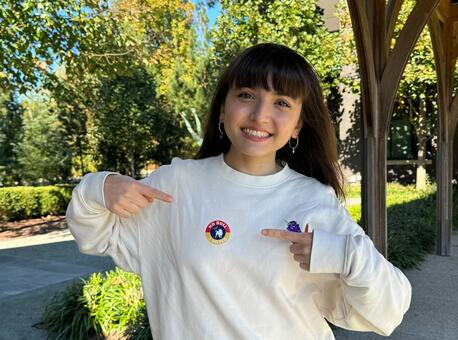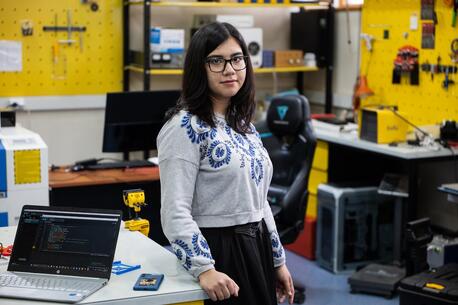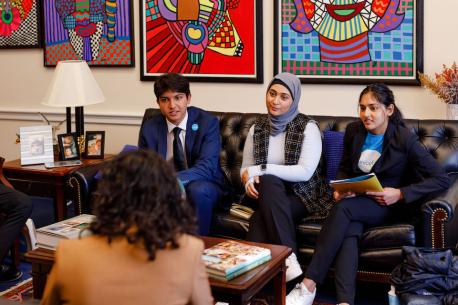
Becoming a Youth Advocate
What do you want to change and why? Young people have the power and the passion to make the world a better place. Two former UNICEF USA National Youth Council members share the roots of their activism, and how UNICEF clubs gave them the tools to expand their knowledge, reach and impact.
When you think of youth advocacy, what comes to mind? Do you envision young people acting as torch-bearers, encouraging change for the better in their communities or in the world? Do you think about the causes young people care about that directly affect us and our generation? Like advocating for mental health resources in classrooms, bridging the educational inequality gap, climate change, ending child marriage or feeling safe in school?
Your first thought might be how, for the first time ever, we who have grown up with social media are equipped with an online platform to share our voices, educate others and ignite movements. No matter what you associate youth advocacy with, we can’t deny that it is a powerful force for positive change. Sometimes even the most powerful.
This International Youth Day, we want to tell you exactly why that is.
Because when we think of youth advocacy, we think of our journeys as UNICEF Youth Advocates and UNICEF USA National Youth Council members. But how did we get here? And what goes into becoming a Youth Advocate?
Here, we share our stories:
Nikki’s story
From an early age, my parents took me on yearly summer trips to our family's hometown in India — a small village located in Jodhpur, Rajasthan. Amidst the rejoicing and reunion with my extended family, I also learned of their hard sacrifices to meet their bare necessities. Here, I repeatedly saw firsthand the stark dichotomy in living conditions between my home in Atlanta and India.
Year after year, I saw an unending cycle of generational inequality. Similar to my parents and grandparents, my cousins walked three miles in the sweltering heat to go to school. I learned how, still, the girls in my family were denied the opportunity to pursue education after middle school, and pushed into early marriage instead. I solemnly noticed how they diligently completed their homework under dimly lit conditions without electricity, rationing their scarce pencils and papers amongst each other. They didn’t have their own bedrooms like I did back home; six or seven people slept in one small room. I learned of their dreams to be doctors, lawyers and professors and how those dreams had to be pushed aside due to the lack of financial support.
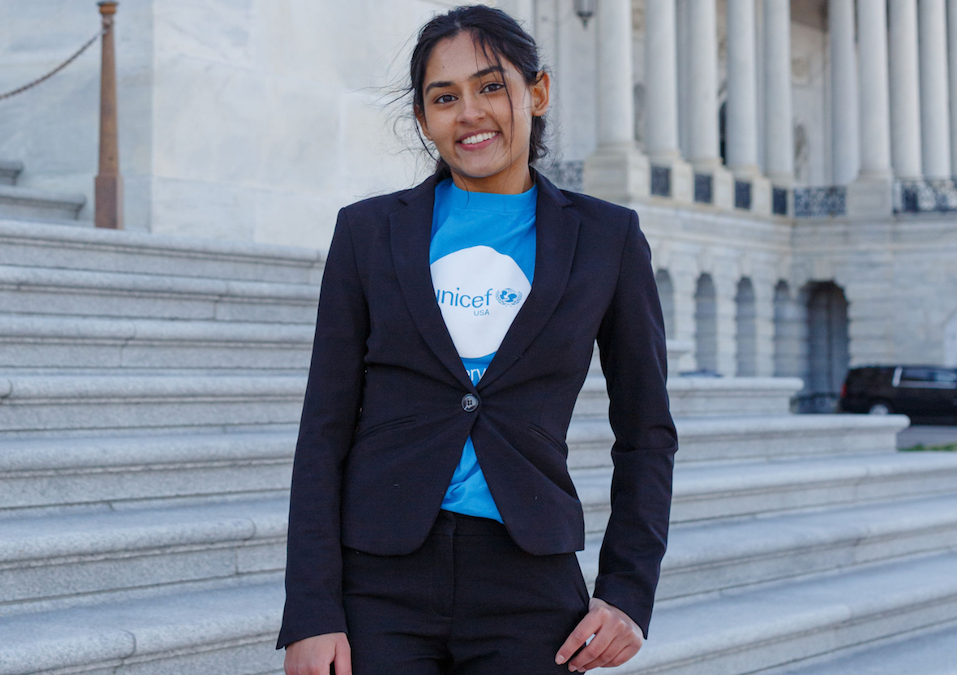
I realized that my family’s marginalized status in India had disproportionately prevented them from accessing vital educational opportunities to help them achieve their dreams.
My time in India sparked a fierce desire in me to take action for my family — by working for others in similar positions in my local community in the United States. I wanted to become an advocate for them, so they could have access to the same opportunities needed to reach their full potential.
But my youth advocacy journey is still ongoing. My family's obstacles in India, such as poverty, child marriage and educational inequality, are still prevalent in many areas today, even here in the United States.
I decided then to partner with SEWA International: a refugee- and disaster relief-focused nonprofit. With their help, I got in touch with newly resettled Bhutanese refugees in the Atlanta area and worked to launch the program “Get Inspired.” To empower and educate refugee children, we provided comprehensive, individualized educational support and career resources for each child that joined us. Through tutoring services, free transportation to clinics and field trips to the zoo or aquarium, I was able to equip these children with some of the resources they need to excel in academics and beyond. But even more, we were able to give them a nurturing place of community, belonging — stability.
But my youth advocacy journey is still ongoing. The obstacles my family faces in India, such as poverty, child marriage and educational inequality, are still prevalent in many areas today, even here in the United States. Joining my high school's UNICEF Club and then being named a member of the UNICEF USA National Council gave me the platform to further learn and advocate to address some of these issues. In the future, I hope to continue advocating for underserved patients in my career as a doctor.
For any aspiring youth advocate, I advise you to identify your passion, do the research necessary to broaden your worldview and be patient and persistent: your voice truly matters in contributing to positive change in your community.
Gheed’s story
Growing up, my earliest and most impactful lesson did not come from a book or a documentary but from the lived reality of the 2003 Iraq War. From its controversial inception to its transformative end and enduring repercussions, this war wasn't just a distant concept for me — it was an experience my family and I shared as five among the millions who endured it. At the age of 2, I found myself immersed in discussions about politics, wartime expenditure and necessary foresight, all shaping my earliest understanding of the world and setting the stage for my advocacy journey.
Amid the turmoil of sectarian conflicts that erupted during the war, my family had to leave our homeland behind. As refugees, we found a new home in the United States, sacrificing familiarity for the promise of a better life and opportunity. My father, a passionate and skilled pediatric surgeon, relinquished his medical license. At the same time, my mother courageously uprooted her life, dedicating herself to nurturing her children without the support of an established community. Their sacrifices became my privilege, a testament to their unwavering commitment to my future.
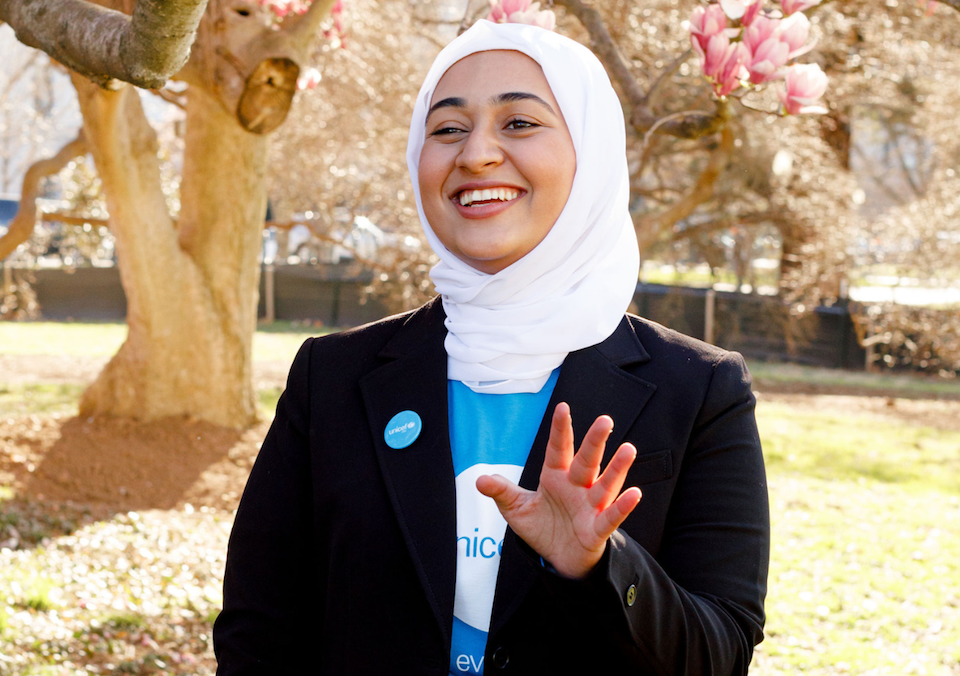
Now, as a premed student, I am driven by a fervent desire to give back and uplift those who have been less advantaged. Looking at the communities around me, especially during the COVID-19 pandemic when educational disparities were thrown into sharp relief, I realized that not every young mind has the opportunity to be cultivated and become a fertile ground for learning and growth. I opened my eyes to the learning inequalities that disproportionately affect marginalized communities, perpetuating a cycle of disadvantage.
This awareness fueled the founding of "Striking Summit," a nonprofit organization committed to forging meaningful partnerships with youth centers in my local community in Georgia. Our mission extends beyond providing resources; we aim to cultivate a sense of belonging, offering tutoring sessions, career webinars, fundraising efforts and tailored support to address the unique needs of each community. We've successfully expanded to four cities nationwide and hope to continue growing and reaching more youth.
For me, my parents' selflessness will serve as my eternal inspiration to serve others.
While my journey is deeply personal, my focus aligns seamlessly with the objectives of UNICEF USA. Advocating for children's access to quality education is now a part of my identity. Each endeavor and partnership turns into a beacon of hope, a step towards a world where every child's potential is nourished, regardless of their circumstances. For me, my parents' selflessness will serve as my eternal inspiration to serve others. For future youth advocates, remember to know the reason driving your commitment, why you want to change someone else's life for the better, and keep that source close to your heart.
Start with the question: What do I want to change and why?
In my high school's UNICEF club, we were given a community and the tools to amplify our voices and passions for children’s rights. As club members, we were given resources that helped us better understand global youth issues. As club leaders, we learned how to mobilize youth in our community. As National Youth Council members, we used our platform to spread awareness and make tangible, lasting change by voicing our concerns to our legislators. Earlier this year, we met with U.S. representatives and their offices to lobby for the MINDS Act (HR. 3988/S.2105), a bill designed to enhance mental health and psychological resources for children in U.S. foreign assistance programs.
On this International Youth Day, no matter what cause you choose to champion as a youth advocate — educational equality like Gheed, refugee empowerment like Nikki or any of the countless other issues impacting youth today — one thing is evident: There is no singular path to becoming a youth advocate. No formula or guidebook is needed. What truly makes a youth advocate is something only you can find in yourself — passion and grit — from wherever that may come from for you. Start with the question: What do I want to change and why?
To any young person contemplating the role of a youth advocate, remember this: you possess the power to effect change. Age, as they say, is just a number. Embrace your unique strengths, find a cause that resonates deeply with your heart and fearlessly step forward as an advocate for what you believe in.
Together, as youth advocates, we wield a potent force for positive transformation in the world.
Are you ready to become a Youth Advocate and make change for the world’s children? Then start a UNICEF Club today!
Nikki and Gheed are UNICEF Youth Advocates. Their terms as UNICEF USA National Youth Council members ended in July 2023.
HOW TO HELP
There are many ways to make a difference
War, famine, poverty, natural disasters — threats to the world's children keep coming. But UNICEF won't stop working to keep children healthy and safe.
UNICEF works in over 190 countries and territories — more places than any other children's organization. UNICEF has the world's largest humanitarian warehouse and, when disaster strikes, can get supplies almost anywhere within 72 hours. Constantly innovating, always advocating for a better world for children, UNICEF works to ensure that every child can grow up healthy, educated, protected and respected.
Would you like to help give all children the opportunity to reach their full potential? There are many ways to get involved.



